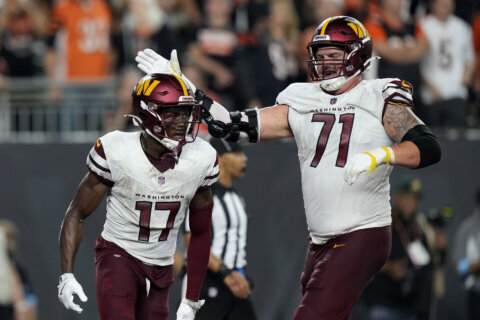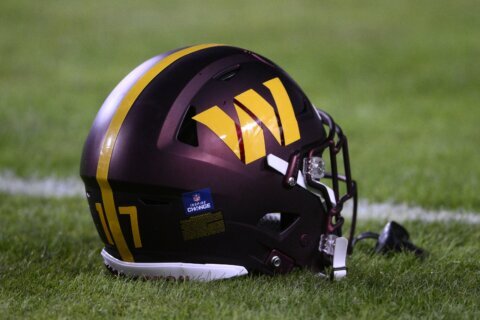This Carson Wentz mistake typified his most maddening quality originally appeared on NBC Sports Washington
Perhaps the most frustrating sequence of Carson Wentz’s season to date began with him doing something extraordinary: escaping the grasp of Micah Parsons.
After faking a shotgun handoff to Antonio Gibson in the second quarter of Washington’s Week 4 contest in Dallas, Wentz impressively evaded arguably the best defender in the NFL, who had barreled toward the quarterback from a blindspot.
That would be the peak of the play for Wentz and Washington, unfortunately.
From there, the signal-caller sprinted out to the right, keeping his eyes downfield the whole time in hopes of linking up with one of his two wideouts (that’s all he had to choose from, as his team opted to protect him with five linemen, two tight ends and a running back). Israel Mukuamu, a Cowboys safety, vigorously pursued Wentz, who at some point needed to realize nothing good was going to come from the rep and simply heave a pass out of bounds.
But that’s not what happened.
Eventually, Mukuamu tripped Wentz up, but before Wentz went down for the sack, he aimed to get the ball past the line of scrimmage. He failed.
Because of that, an intentional grounding was called, the Commanders were forced into a second-and-22 that they couldn’t overcome and both the QB and his offensive coordinator had to answer for the gaffe this week.
Washington Football Talk Podcast | Listen and Follow | Watch on YouTube
“Trying to hang on to it, trying to get a receiver to break, should have just gotten rid of it earlier,” Wentz said Wednesday when reflecting on the error.
“Don’t take a negative,” Scott Turner added Thursday when discussing the lesson for Wentz from that particular moment.
The two members of the Commanders didn’t have much else to say about Wentz’s penalty. That’s understandable since the difference between what Wentz did and what would’ve ideally happened was so plainly obvious.
Therein lies the struggle of relying on the 29-year-old to run an offense, one that Washington is beginning to grow accustomed to.
Following an MVP-level campaign in 2017 in Philadelphia, Wentz has become a coin-flip sort of quarterback; each dropback can end in a number of ways, with outcomes positive and problematic on the table.
“It’s like he thinks he’s Brett Favre,” one Eagles reporter said in July when speaking about Wentz’s tendency to reject small successes in an effort to create grander highlights.
That risky style is largely what fueled Wentz’s rapid ascension as a pro, but now, it appears to be hastening his demise. Once he dodged Parsons at AT&T Stadium, one thought should’ve entered his mind: Throw it away. As Wentz explained on Wednesday, though, he remained fixated on producing a completion, which ultimately damaged a promising possession.
It’s not like that intentional grounding is the lone example in 2022 of Wentz botching what was ultimately a simple decision, either. He’s unwittingly backed into multiple sacks, tossed a couple of confounding interceptions and often overlooked available targets underneath to instead jam attempts into much more confined windows.
The most troubling part? This Sunday’s matchup with the Titans will be Wentz’s 90th professional start. If he’s still responsible for such miscalculations this far into his career — and not orchestrating enough enormous gains to cancel them out like he once did — it’s difficult to imagine him ever drastically improving overall.
During a different part of his Wednesday press conference, Wentz was asked about his level of patience in the offense. Following a tremendous Week 1 — a triumph that he starred in, by the way, showing that he can be an asset when he’s in rhythm as opposed to in a rut like he presently is — the unit’s performance has noticeably declined.
“We have seen spurts of what we are capable of,” he said, “and for us it’s just now, ‘Can we go be consistent?'”
He might as well have been assessing his own contributions in that back and forth, whether they be those with the Commanders or across his past few years entirely. And barring a dramatic and unexpected transformation, the answer to his rhetorical question sadly seems like it’s going to be a no.







